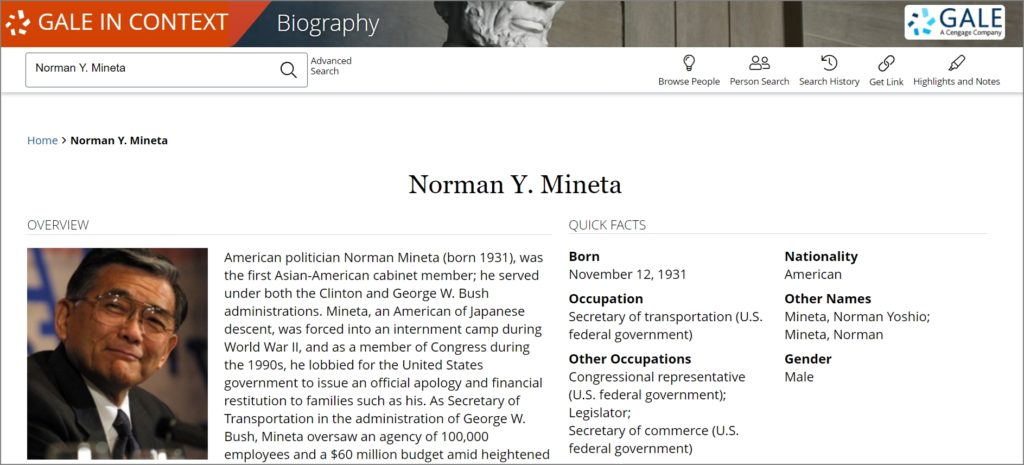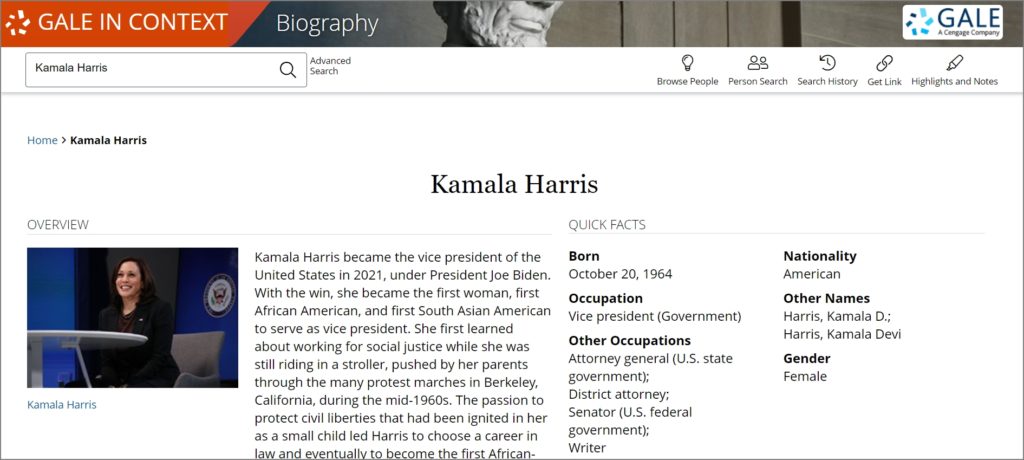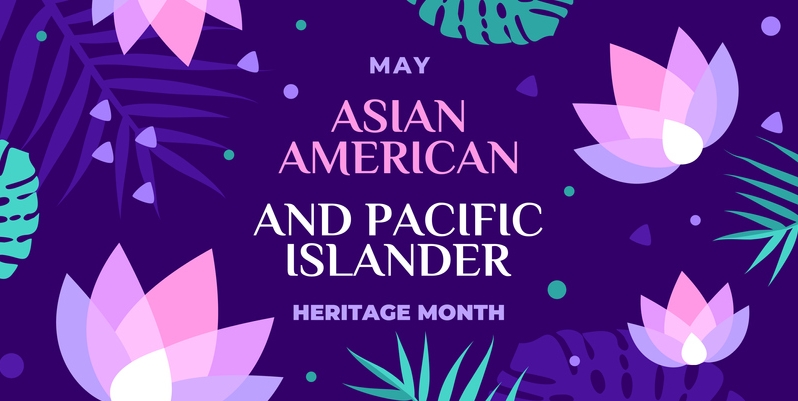| By Carol Brennan |
The month of May is designated Asian American and Pacific Islander (AAPI) Heritage Month to illuminate the contributions of millions of Americans whose family origins are in Pacific Rim nations or the Asian subcontinent. Layered throughout Gale In Context: Biography are hundreds of incisive essays that honor the most courageous activists and celebrated trailblazers from the AAPI community.
In 1971, voters in San Jose, California, elected Norman Y. Mineta (born 1931) as mayor, making him the first Japanese American to serve in that role outside of Hawaii. Mineta went on to represent his California district in the U.S. House of Representatives, where in 1977 he introduced a resolution to designate the first 10 days in May as Pacific/Asian American Heritage Week.

As a 10-year-old in San Jose in the early 1940s, Mineta was forcibly relocated with his family to an internment camp for Japanese Americans during World War II. A 23-year-old native Californian, Fred Korematsu (1919–2005), resisted the federal order for all Japanese Americans to be placed under military guard and, with the help of the American Civil Liberties Union, took his case to the U.S. Supreme Court, which upheld the law. Decades later, in the early 1980s, Korematsu was a key figure in the movement to redress this shameful period of American history.
The 1980s were a particularly challenging period for AAPI civil rights. There was a conservative uproar in 1981 when a Yale University undergraduate named Maya Lin (born 1959), a Chinese American, won a national design competition for a planned memorial to veterans of the Vietnam War in Washington, D.C. A year later, a Chinese American professional named Vincent Chin was beaten to death with a baseball bat by two unemployed Detroit-area autoworkers. That 1982 murder shocked many Asian Americans of Chin’s baby boomer generation, among them journalist Helen Zia (born 1952),who worked with other community activists to urge federal officials to have the assailants prosecuted for hate crimes.
Negative portrayals of Asian Americans and Pacific Islanders in film and television have become a focal point for a new generation of activists in the twenty-first century. Among the most prominent voices are Hari Kondabolu (born 1982), a comedian of South Asian descent who made the 2017 documentary film The Problem with Apu about a character on the long-running animated television comedy The Simpsons, and New York City restaurateur Eddie Huang (born 1982), whose memoir of growing up the son of Taiwanese immigrant parents became the basis for the hit ABC television series Fresh Off the Boat. One of the breakout stars of that sitcom was Constance Wu (born 1982), who has campaigned to broaden the roles that Hollywood offers to Asian American actors.
The inauguration of U.S. Vice President Kamala Harris (born 1964) in 2021 represented a dramatic milestone for Asian Americans, Black Americans, and millions of American women. Civil rights activists looking ahead hope that the 2020s will bring the first Supreme Court justice of AAPI descent. Potential nominees include Sri Srinivasan (born 1967), a District of Columbia bench judge who was born in Chandigarh, India, and Harold Hongju Koh (born 1954), the former U.S. State Department official and Yale Law School dean who is the son of Korean immigrants.

You can read more about these Asian Americans and Pacific Islander Americans and others in Gale In Context: Biography.
Not a Gale In Context: Biography subscriber? Learn more about this authoritative database >>

About the Author
Carol Brennan has been writing biographical entries for Cengage/Gale since 1993. If she’s not writing, she is either at yoga or walking her dachshund. Carol consumes an alarming volume of podcasts and audiobooks weekly.


